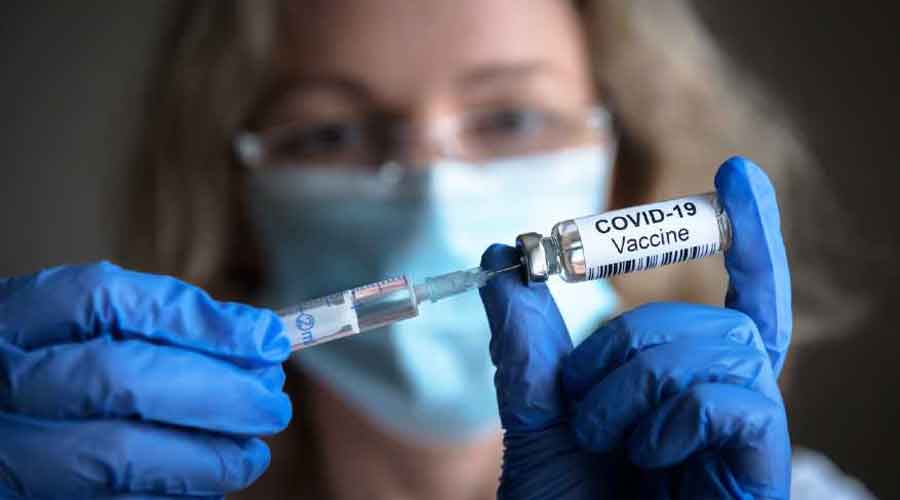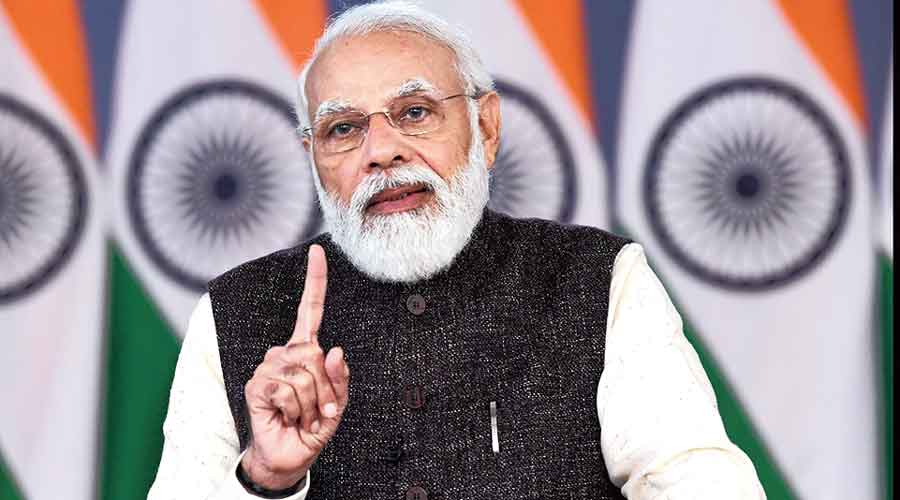India’s decisions to offer Covid-19 vaccines to adolescents aged between 15 and 18 years and boosters to healthcare workers and people 60 years or older who have co-morbidities are precautionary moves without adequate scientific evidence yet to back them, some experts said on Sunday.
Prime Minister Narendra Modi’s announcement of the decisions, to be implemented from January, came a day after health officials said India was still assessing scientific evidence for children’s immunisation and boosters.
The announcements have evoked widespread applause from sections of the medical community that had urged the government to introduce vaccines for children and boosters for vulnerable adults amid fears of omicron-driven surges.
The Indian Medical Association, the country’s largest body of doctors, on Sunday said the boosters would help protect healthcare workers ahead of an anticipated Covid-19 wave and that the vaccines for children would “add safety” as schools open.
But three vaccine policy makers had told The Telegraph in the past few days that India was not ready yet for decisions on boosters despite ample vaccine stocks. This is because of inadequate data to assess the duration of vaccine effectiveness and, therefore, uncertainty about the possible public health gains from boosters.
“A decision on boosters will be taken based on scientific evidence and our situation and circumstances,” said a senior expert guiding the government’s vaccination policy. “For this, there is a continuing review of studies and data related specifically to vaccines that have been administered in India.”
At the Union health ministry’s briefing on Friday — 30 hours before Modi’s Saturday night announcements — top health officials had asserted that India was still assessing scientific evidence for lowering the age for vaccines and for boosters. Health secretary Rajesh Bhushan had said that India’s decisions would be “governed by science”.
“We’re reviewing scientific data from across the world as well as from India,” Balram Bhargava, director-general of the Indian Council of Medical Research, had said on Friday. He had added that the reviews would cover immune responses and duration of protection from the vaccines.
He had also outlined the decision-making protocols. The country’s apex expert panel, called the National Technical Advisory Group on Immunisation (NTAGI), would make recommendations that would go to the National Expert Group on Vaccine Administration for Covid-19 and then be accepted by the health ministry.
Queries from this newspaper to health officials on whether Saturday’s announcements were made at a time technical experts were still assessing scientific evidence have not evoked replies.
Two vaccine policy experts told this newspaper on Sunday that the NTAGI had until Saturday recommended neither vaccines for those aged between 15 and 18 nor booster doses for the elderly. This was primarily because of inadequate data from within the country to back either decision, they said.
But a top public health expert said the lack of data or evidence need not hold back a no-regrets policy.
“If data are inadequate for a definitive assessment of risk, the right thing would be to adopt a course that averts or reduces the risk through methods known to be safe and possibly beneficial,” said K. Srinath Reddy, president of the Public Health Foundation of India, New Delhi.
Reddy and other experts have argued in recent weeks that, amid concerns about omicron-driven surges, India should adopt a strategy that seeks to accelerate full vaccination of all adults while simultaneously opening boosters to high-risk groups such as healthcare workers and the elderly at risk of severe disease.
Although early evidence suggests that omicron is associated with mild disease, experts are concerned that rapid spread across India’s large population might overwhelm hospital resources. They say there is a need to protect at least the high-risk groups from severe disease.
“The likely benefits of boosters for at-risk populations greatly outweigh the costs,” Reddy said.
Sanjay Rai, professor of community medicine at the All India Institute of Medical Sciences, New Delhi, has questioned the decision to provide vaccines to adolescents aged 15 to 18 years.
“I am a great fan of PM Modi for his selfless service to (the) nation and taking right decisions at right time. But I am completely disappointed with his unscientific decision on children vaccination,” he tweeted early on Sunday.
Rai said there was no evidence yet for public health benefits arising out of vaccinating children. “A public health intervention such as vaccination has to have clear objectives — either to prevent infections or to avert severe disease,” Rai told this newspaper.
“We know from observations worldwide that the current vaccines do not prevent omicron infections,” he said.
“We also know that the incidence of severe disease is extremely low in this age group. Where is the evidence from India or elsewhere in the world that the risk-benefit ratio favours vaccines for children in this age group?”
Multiple countries — Australia, China, Japan, the UK and the US, among others — have introduced boosters for adults or vulnerable population groups. But vaccine experts say India’s unusually large proportion of people already infected with Covid-19 and its substantial vaccination coverage necessitates that decisions on boosters are taken with scientific evidence of public health gains.
The experts said that decisions on boosters need to be country-specific and vaccine-specific.
“For many Indians, their first vaccine doses served as their boosters,” said Jayaprakash Muliyil, a community medicine specialist and chair of the scientific advisory committee of the National Institute of Epidemiology, Chennai.
A nationwide survey by the Indian Council of Medical Research had suggested that by the time the country’s second wave was receding in early July, 67 per cent of the population had already been infected by Covid-19. Experts believe that over 80 per cent have been infected by now.
“Most people in India thus have acquired immunity against Covid-19, first from the virus and then from the vaccines,” Muliyil said. And in those who had infections after vaccination, the virus would have stimulated fresh immune responses.
While the rationale for boosters is based on observations of falling levels of vaccine-induced anti-viral antibodies in the blood, experts say the body may continue to fight Covid-19 through another arm of the immune system, called memory T-cells.
“Although we’re seeing a reduction in neutralising antibodies, almost all data show that T-cells remain intact. That is what we really require,” said Abdi Mahamud, a physician and an infection control specialist at the World Health Organisation.
“T-cells, the second pillar of an immune response, can prevent severe disease by attacking infected human cells.”
An immunologist said: “I can’t think of any country in a situation like ours — most people are already infected and over 60 per cent of our adults are fully vaccinated.”
Scientists are hoping that this “hybrid immunity” — triggered by the combination of infections and vaccines — will help protect people from severe disease.
Health officials had said on Friday that scientific experts were reviewing data on immune responses as well as on hybrid immunity ahead of any decision on boosters.
While Covid-19 has also hit parts of Europe and North America hard, most people in those continents acquired immunity first from vaccines — not from Covid-19 infections.
Experts are also wondering which vaccines India would choose as boosters for whom, because clinical studies to find out whether boosting with the same vaccine or using a different vaccine is the more effective strategy are still going on.











